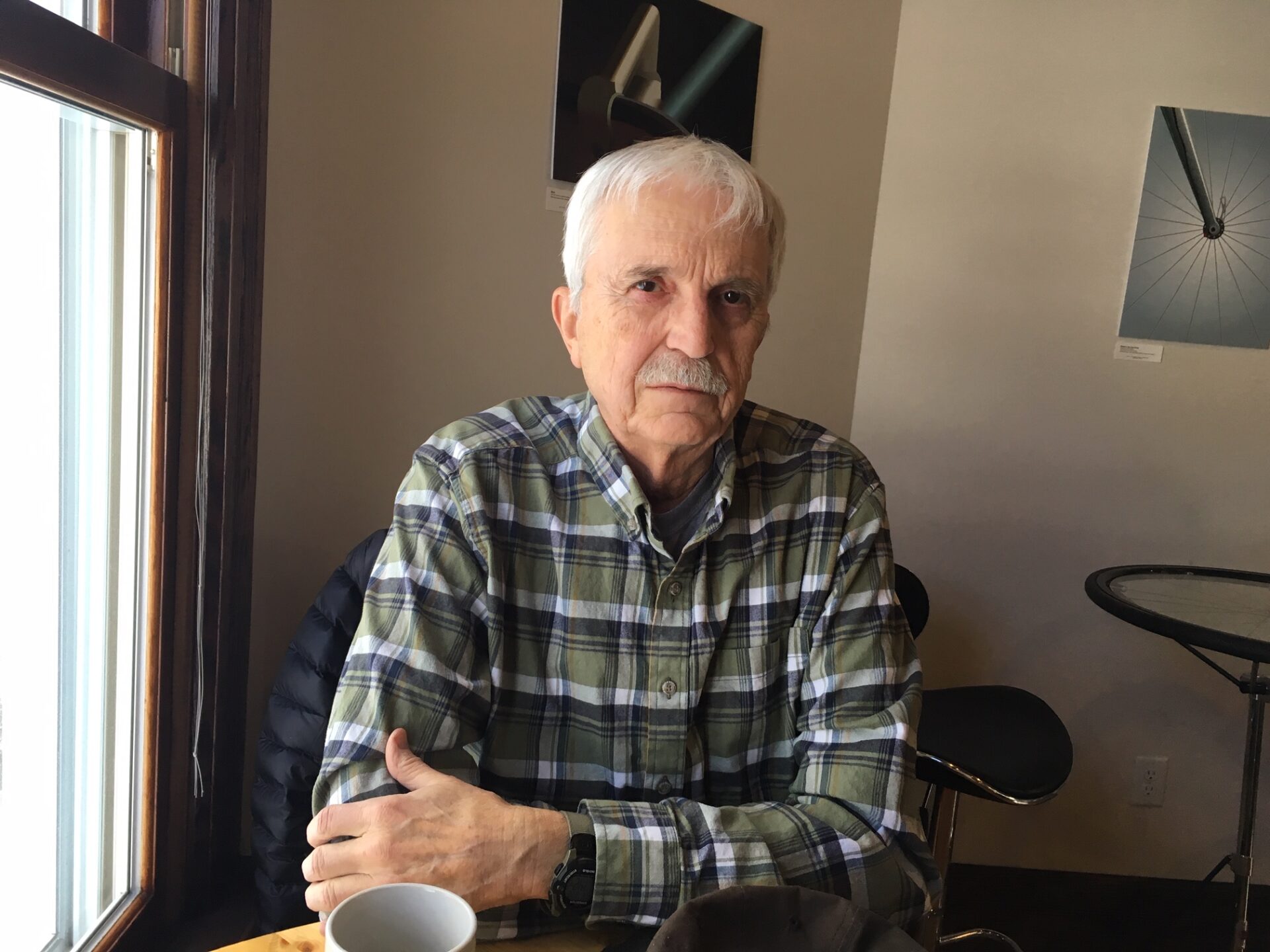Brian Cabell probes the mind and the life of 70-year-old historian and writer Fred Stonehouse, who also happens to be Marquette’s mayor.
BC: You’re not a native Michigander, right?
FS: Right. I was brought up in New Jersey, we had a house down at the seashore. Seaside Park. My mother, father, two brothers and a sister. With the beach right there, we were always doing water-based activities–swimming, fishing, diving, chasing pirate gold, looking for treasure and shipwrecks. We were on a barrier island off the New Jersey coast–it was just like North Carolina’s Outer Banks, just without the publicity. It was really a wonderful place.
BC: How would you describe yourself as a boy?
FS: I guess I’d say “average.” I probably tended more toward the nerdish side, I read a lot. Not athletic at all.
BC: What kind of books did you read?
FS: I just remember reading early on. I had an uncle who always had a book in his hands, and he’d come by for dinner and he always brought books for us kids. For me it was mostly history and biographies. I also remember reading Tom Swift.
BC: So you spent your high school years in New Jersey, as well?
FS: Yes, and then I came out to Northern to go to college. I had a high school chum who was a year ahead of me, and he discovered Northern and he enjoyed it. This was a period in 1966 when all the colleges on the East Coast were overwhelmed with students–it was the beginning of the Baby Boom–and the schools couldn’t handle the number of applicants, but Northern had vacancies and I was able to take one of them.
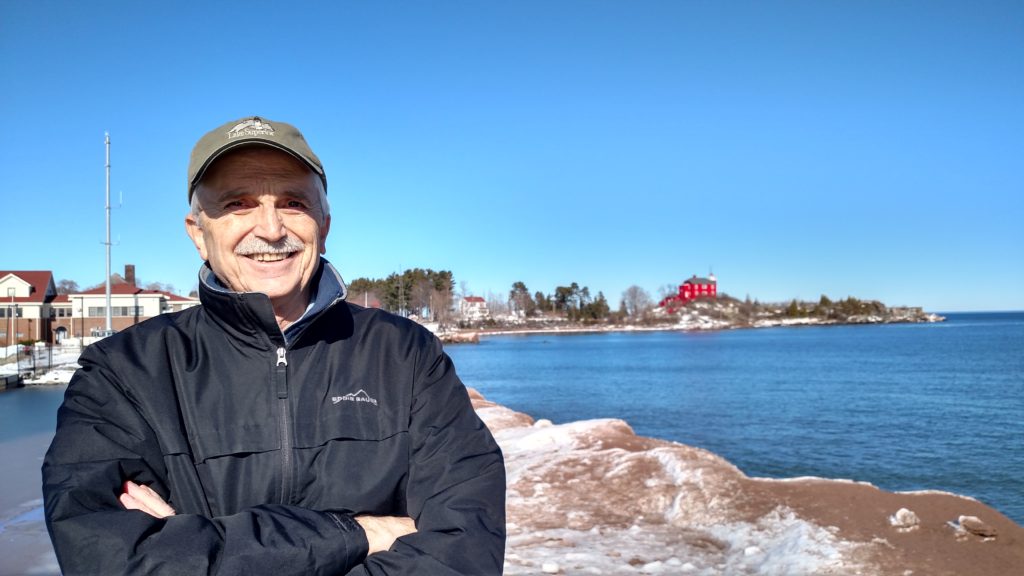
BC: Had you ever been to Marquette?
FS: I had never been here, never been to Michigan, never been to the Upper Peninsula, never had seen more than ten inches of snow at a time so it was a religious experience to go through an Upper Peninsula winter. I can tell you by mid-winter I had filled out my application for the University of Miami. (Cabell laughs) Seriously. By springtime, though, I had made friends, I had acclimated, and I realized what a special place this was.
BC: What did you study at Northern?
FS: I graduated with a major in political science and broadcast speech as a minor.
BC: And you intended to do what?
FS: I didn’t know. I was one of those kids who goes through school who figures he’s going to do something but didn’t quite know what. I accumulated a teaching degree along the way, but then I realized that was the last thing I wanted to do. There was a great world out there to see and I wanted to see it. This was 1970 so I joined the Army. That was after I attempted to join the Air Force, but I couldn’t get in because I had a bad eye. I failed my final Class A flight physical so that went down. The Navy was not accepting applicants at that point. So that led me to the Army.
BC: That was the Vietnam era. You were hoping to go to Vietnam?
FS: That was not my intention on enlisting. There was a a program that allowed you a shot at Officer Candidate School. You went through basic training, and advanced training, and you hung around for a while until a slot opened in an OCS program. And that’s what happened. I graduated OCS and became commissioned as a signal officer. After a while, I started badgering them to send me to Vietnam because I wanted to see it. I wanted to understand what was going on. And I did end up with a Vietnam assignment early in my career.
BC: When was that?
FS: This was 1972 when we were winding down. All of the heavy work had been done. They were shooting at us once in a while but it wasn’t like it was in 1966 or 1967.
BC: What was your impression when you got there?
FS: My impression was one of fascination, more than anything else, because I was doing and seeing things that you wouldn’t see anywhere else. So we land there, get on a bus which was covered with barbed wire to keep the RPG’s from coming in, we get all our basic uniform stuff, everything but a weapon, and I’m sitting around in a room that was pretty much empty and wondering, “What do I do now?” And I knew the answer to that, and that was, get a beer. So I wandered out to the front gate where there was a small Vietnamese guard, and he pointed to one of those three-wheeled jitneys, and I gave the driver a dime. He took me a few hundred yards away to a building that was covered in sand bags. I opened the door and there is a gentleman in a full tux. It’s about eleven in the morning. He says, “Sir, may I help you?” I said I was looking for the Officers Club and he said I had found it. He asked if I was a club member. I said no. Okay, over here, you’ll have to join. Two dollars. So I pay. It was this palatial building and I hear this “oom-pah-pah” music. It’s October. I walk down the hall and there’s this big room, an “oom-pah-pah” band on the stage, everybody’s on the tables, they’re singing, they’ve got the big beer steins, they’ve got bartenders that the Air Force has flown in from Germany. So I had sauerkraut, schnitzel and sausage, and then went home, and said, “This is not a bad war.”
BC: You say it was toward the end of the war. Did you ever come under fire?
FS: An ambient rocket once in a while, that was it. I was never in combat as you would traditionally think. I came home in ’73 when my tour was finished.
BC: And then you stayed in the Army?
FS: I stayed for 27 years. I spent time in Germany, in Italy, in Turkey, in Honduras.
BC: So you were fulfilling your desire to see the world.
FS: Yeah, I saw the world, I went all over the place. I did things I never thought I’d do.
BC: Did you love your time in the Army?
FS: I’d do it again tomorrow. But saying that, you also get worn out. At some point, you just say, “I’m done.”
BC: For those of us who’ve never served in the military, what are we missing?
FS: (He pauses) Many things. But I think the thing that most people are missing is the opportunity to “mix”–for want of a better word–with what America is. When I went through Basic and I went through Advanced Training, we had the opportunity to meet folks from all around this country, all social and economic backgrounds, all in the same pot together. That was really a great opportunity to understand other people–about their motivations, about who they are. We were all Americans, all together, and all in this pot. I think by not serving in the military, you don’t have that opportunity.
BC: What rank did you retire at?
FS: I retired as a lieutenant colonel in 1997.
BC: And at that point, you chose to come back to Marquette?
FS: I don’t think I ever left. Once you got here and you went through that winter, this was where you were going to be. You had made friends, you began to really love and understand the area, you found people that were absolutely fantastic. The really great attribute of Marquette is the people.
BC: So even though you’d been all over the world for the previous 27 years, you still regarded Marquette–
FS: I still regarded Marquette as my home. Jersey wasn’t home. But here it was special. I mean was a a college kid when I first arrived, I’m in town, I’ve got a check drawn on a bank in New Jersey, this was an era when you didn’t have a picture on your driver’s license, and I went into the Union First National Bank on Third Street, and they cashed the check. And there was no question. Nobody would do that! But they did. And that to me spoke volumes that you were welcome here.
BC: So you came back in ’97–
FS: Well, I should add that in the meantime I had married my wife in 1980. She’s from Negaunee. So we both had that connection. And I had always kept up with Northern, I had always kept up with friends in Marquette, I’d been up here visiting, I was working with the National Guard units here, so I was always here even though I may not have actually been here. I’m not a Yooper but I’m galvanized.
BC: So you and your wife come back to Marquette in ’97, you’re retired military, you’ve got a pension…Then what?
FS: Well, taught a little bit at Northern, I still do–teaching history. I still do a lot of writing and consulting. I was doing a lot of writing even before I left active duty. My wife works as the accountant for Marquette Township. She’s still doing that. The overwhelming thing is you are where you want to be doing what you want to with people you want to be with.
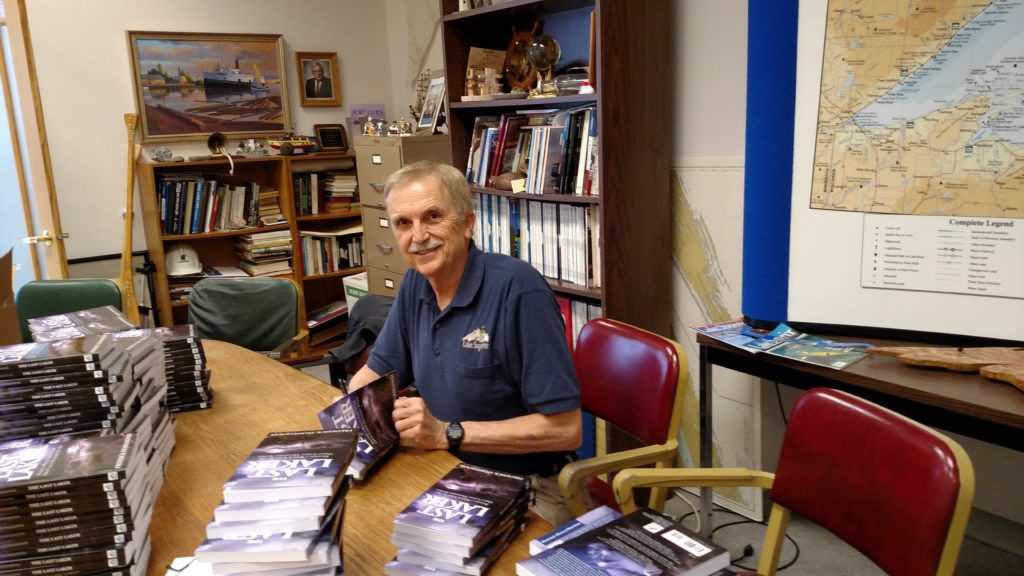
BC: So above all, what is about Marquette that’s so appealing and so important to you?
FS: It’s the people. Every town says, “Come visit us. We’re a friendly place.” But I think there’s a spirit of being an entrepreneur here that’s different from other places. There’s a spirit of people who truly want to be here—they don’t feel trapped here. I know from speaking with folks in other towns, that’s their thought process–they’re trapped, they can’t leave. Marquette’s been really fortunate in having the university which produces a huge diversity of people and produces a vibe of students who are in the town that plays very well. Then we have the hospital and we get out of that professional medical practice and educational uplift in the community. And then we got the big lake out there, a wonderful natural environment. You put all those things together, and you have to say, “This is a good place.” We’re not perfect, we’re not Pleasantville, but this is a good place.
BC: You clearly still have an interest in history, and anything maritime. Where did that come from?
FS: That came from childhood. That came from New Jersey, the Jersey shore. That’s always fascinated me.
BC: Do you spend much time out on the sea, on the lake?
FS: I used to hold a captain’s license but I gave that up in August. I just got too old.
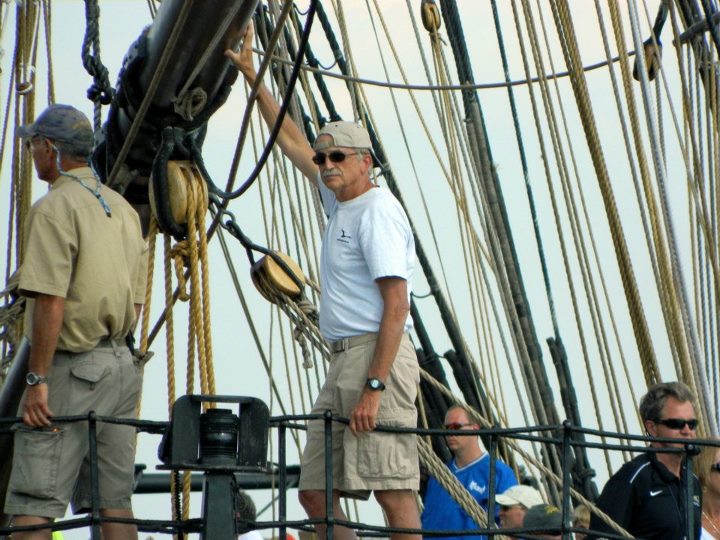
BC: And why the interest in history?
FS: If you don’t know who you were, then you don’t know who you are, and you have no idea where you’re going.
BC: You’ve gotten involved in local politics. When did that start?
FS: I guess it was shortly after I arrived in Marquette, probably in ’98, and that was being a member of the harbor committee–I did that for a long time, and I ended up chairing a number of committees on various things. I have this very strong belief that you should try to move the city forward. I hate politics and I hate being a political functionary, that’s not what I’m trying to do. But I want to keep the city progressive, keep it growing, and by “growing,” I don’t mean getting bigger. I mean, getting better. I feel very strongly that every citizen has the responsibility to help push the wagon–the wagon of Marquette. And I feel that I’m helping to push it forward.
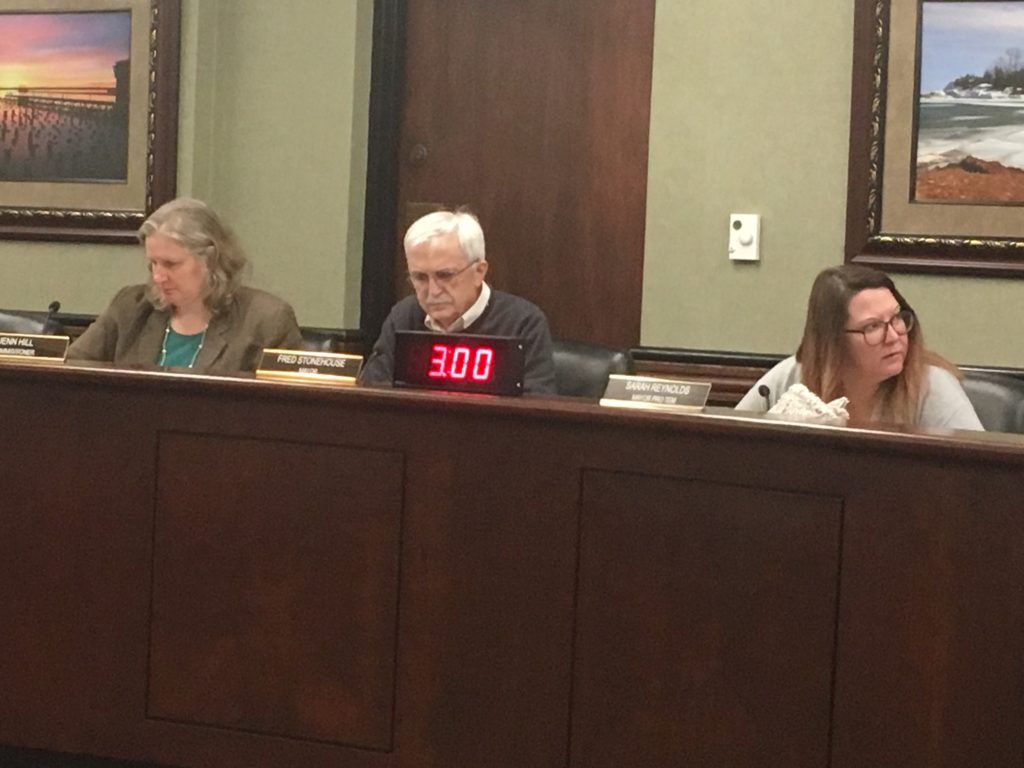
BC: When did you get involved in electoral politics?
FS: I gotta think. I believe it was 2008. I’ve been a city commission for six years, then I was off–by charter we have to be off for two years, then two more years. (He’s now mayor).
BC: If there’s a negative to what’s happening in Marquette these days, what would it be?
FS: I think what always worries me is people making decisions when they don’t have all the information. In other words, the rise of social media has given rise to rumors and fake news. Somebody will throw something out, and automatically everybody jumps on it as being true. And that creates a lot of heartburn and heartbreak and angst in the city. That becomes a significant problem.
BC: What about the physical development of the city? That’s been changing. Does that concern you?
FS: I think we’re doing it properly. You always have to balance that with reality. The city of Marquette is largely dependent on property taxes for its income. Whether it’s a business or a private home, that’s what’s paying the bills of the city. Unlike some cities downstate that have a big GM factory that’s turning over a pile of money, we don’t have that. And as of April, our biggest taxpayer (the Presque Isle Power Plant) is going away. So when you look at development, it’s gotta be done with the idea that, “Okay, guys, we’ve gotta pay for the good things we like,” and if that means development, that’s the cost we have to pay. That said, we’re not Traverse City, we’re never going to be Traverse City. We haven’t sold the lakeshore. In fact we have added to it significantly. If you look at the information that the county puts out, the bulk of all the public property on Lake Superior is in the city of Marquette. The rest of the county has virtually nothing. Would I rather that the development not be on the lake, yeah, I’d rather there be nothing but park there, but the reality is that nearly sixty percent of the land in Marquette is tax-free. We can’t survive like that.
BC: Let’s get back to you. What’s the perfect day for Fred Stonehouse?
FS: Perfect day is get up in the morning, have a cup of coffee, sit down at the computer and do another chapter. I’m working on something, I’ve always got a couple books in the balance.
BC: How many books have you written?
FS: Somewhere upwards of thirty. They’re all history or maritime in some fashion. Most of them dealing with the Great Lakes, a few on the Eastern seaboard.
BC: What else do you do?
FS: My wife and I enjoy getting out a couple times a week and going to the great restaurants in town The food opportunities in Marquette are just terrific. That’s been fun. We enjoy traveling. And I finally went skiing recently for the first time in six years–I have a couple of fake knees and I was concerned with that but I finally decided I wasnt getting any younger, let’s give it a shot. And it worked out fine.
BC: Final question. In the great beyond, after we’re gone, what’s out there?
FS: (He pauses for ten seconds) I am a Christian so I will have to say I believe in the after life.
BC: Thanks , Fred.


